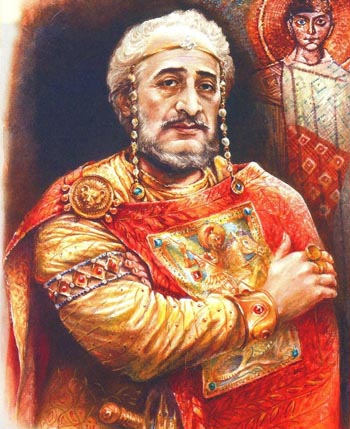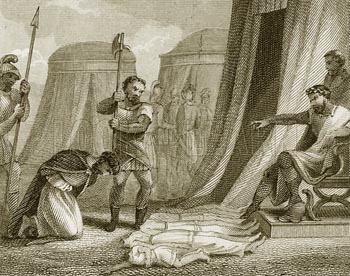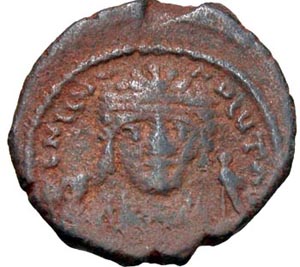Stories & Legends
 |
 |
 |
 |
 |
 |
 |
Emperor Maurice Asks to Atone for
His Sin on Earth
To prefer the fire of Purgatory to making penance and prayer in this life is the greatest of follies. The Byzantine Emperor Maurice (582-602) understood this and acted wisely. History relates that this Prince, notwithstanding his good qualities which had endeared him to St. Gregory the Great, towards the close of his reign committed a grave fault, and atoned for it by an exemplary repentance.
 His was a reign marked by constant warfare against the Avars and Slavs in the Balkans, Lombards in Italy and the Persians from the East. This outstanding General helped transform the shattered late Roman Empire into a new and well-organized medieval Byzantine Empire.
His was a reign marked by constant warfare against the Avars and Slavs in the Balkans, Lombards in Italy and the Persians from the East. This outstanding General helped transform the shattered late Roman Empire into a new and well-organized medieval Byzantine Empire.
Having lost a battle against the Khan or King of the Avars in 599, Maurice refused to pay the ransom of the prisoners, although he was asked but the sixth part of a gold coin, which is a mere pittance.
This mean refusal put the barbarous conqueror into such a violent rage that he ordered the immediate massacre of all of the 12,000 Roman soldiers.
Then the Emperor acknowledged his fault, and felt it so keenly, that he sent money and candles to the principal churches and monasteries, to beg that God would be pleased to punish him in this life rather than in the next.
These prayers were heard. In the year 602, after ordering his troops to pass the winter beyond the Danube because of shortage of funds to return them home, a mutiny arose among them. They drove away their general, and proclaimed their leader Phocas as Emperor and marched on Constantinople, which ceded to them, deserting the Emperor Maurice.
 Maurice was obliged to fly in the night, after having divested himself of all marks of royalty. Nevertheless, he was recognized. He was taken, together with his wife, five of his sons, and
his three daughters – that is to say, his whole family with the exception of his eldest son.
Maurice was obliged to fly in the night, after having divested himself of all marks of royalty. Nevertheless, he was recognized. He was taken, together with his wife, five of his sons, and
his three daughters – that is to say, his whole family with the exception of his eldest son.
Maurice and his five sons were unmercifully slaughtered near Chalcedon. The carnage began with the youngest of the Princes, who was put to death before the eyes of the unfortunate father, without uttering a word of complaint. The rest were then beheaded, and finally the Emperor himself.
Remembering the pains of the other world, Maurice esteemed himself happy to suffer in the present life, and throughout the massacre of all of his five sons, he spoke no other words than those of the Psalmist, Thou art just, O Lord, and Thy judgment is right (Ps. 118:137).




Emperor Maurice, as represented in the Rulers of the Byzantine Empire by Kibea
Having lost a battle against the Khan or King of the Avars in 599, Maurice refused to pay the ransom of the prisoners, although he was asked but the sixth part of a gold coin, which is a mere pittance.
This mean refusal put the barbarous conqueror into such a violent rage that he ordered the immediate massacre of all of the 12,000 Roman soldiers.
Then the Emperor acknowledged his fault, and felt it so keenly, that he sent money and candles to the principal churches and monasteries, to beg that God would be pleased to punish him in this life rather than in the next.
These prayers were heard. In the year 602, after ordering his troops to pass the winter beyond the Danube because of shortage of funds to return them home, a mutiny arose among them. They drove away their general, and proclaimed their leader Phocas as Emperor and marched on Constantinople, which ceded to them, deserting the Emperor Maurice.

His five sons were killed before Maurice's eyes
Maurice and his five sons were unmercifully slaughtered near Chalcedon. The carnage began with the youngest of the Princes, who was put to death before the eyes of the unfortunate father, without uttering a word of complaint. The rest were then beheaded, and finally the Emperor himself.
Remembering the pains of the other world, Maurice esteemed himself happy to suffer in the present life, and throughout the massacre of all of his five sons, he spoke no other words than those of the Psalmist, Thou art just, O Lord, and Thy judgment is right (Ps. 118:137).

Maurice, portrait on a solidus

Adapted from Purgatory by Fr. F.X. Shouppe, S.J.,
London, 1920, pp 52-53
Posted November 2, 2024
London, 1920, pp 52-53
Posted November 2, 2024






